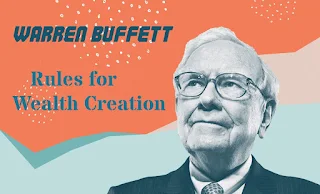Warren Buffett, often referred to as the "Oracle of Omaha," stands as one of the world's most celebrated and successful investors. His journey from a young boy fascinated by numbers to a billionaire investor is a testament to his unique investment philosophy and strategies. In this post, we'll delve into the wealth-building wisdom of Warren Buffett and explore the strategies that have made him an investment legend.
Investment Philosophy: Value Investing
Warren Buffett's investment philosophy is rooted in the concept of value investing. He looks for companies that are trading below their intrinsic value, essentially seeking bargains in the stock market. This approach, championed by his mentor Benjamin Graham, emphasizes buying undervalued stocks and holding them for the long term.
The Long-Term Perspective
One of the cornerstones of Buffett's success is his unwavering commitment to the long term. He believes in the power of compounding, and this belief has led him to hold onto investments for years, even decades. Buffett's advice to "be fearful when others are greedy, and greedy when others are fearful" underscores the importance of patience and discipline in wealth-building.
Stock Selection Criteria
Buffett's investment decisions are guided by a set of criteria:
- Strong Fundamentals: He looks for companies with robust financials and a track record of consistent earnings.
- Competitive Advantages: Buffett seeks businesses with a durable competitive advantage or economic moat that protects them from competition.
- Ethical and Competent Management: The leadership of a company plays a crucial role, and Buffett places high importance on trustworthy and capable management teams.
- Favorable Valuation: He insists on a margin of safety, buying stocks that are trading at a discount to their intrinsic value.
Diversification vs. Concentration
Unlike conventional wisdom that preaches diversification, Buffett often takes concentrated positions in a handful of stocks he believes in. This approach allows him to focus on his best ideas and maximize returns.
Avoiding Speculation and Market Timing
Buffett avoids speculation and market timing, recognizing that it's nearly impossible to consistently predict short-term market movements. He's a staunch critic of financial derivatives and complex investment products, preferring simplicity and transparency in his investments.
Margin of Safety
The concept of a margin of safety is fundamental to value investing. Buffett invests with a margin of safety, which means he only buys a stock when he believes its intrinsic value is significantly higher than its market price. This cautious approach helps protect his investments from downturns.
Continuous Learning and Influence of Benjamin Graham
Buffett is a voracious reader and a firm believer in lifelong learning. His early mentorship under Benjamin Graham, author of "The Intelligent Investor," had a profound impact on his investment approach. He continues to share his insights and knowledge through his annual letter to shareholders.
Philanthropy and Giving Back
Despite his immense wealth, Buffett remains grounded and committed to philanthropy. He pledged to give away the majority of his wealth through the Giving Pledge, inspiring other billionaires to do the same. His generosity has contributed to various charitable causes and has left an indelible mark on the world beyond finance.
In conclusion, Warren Buffett's wealth-building strategies are grounded in time-tested principles of value investing, discipline, and a long-term perspective. While emulating his success may be a challenging endeavor, understanding and incorporating these principles into your investment strategy can lead to more informed and prudent financial decisions. Warren Buffett's legacy serves as a beacon of wisdom for investors, reminding us that wealth is built not through speculation, but through knowledge, patience, and a keen eye for value in the market.












0 Comments